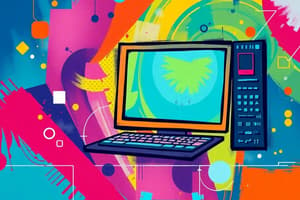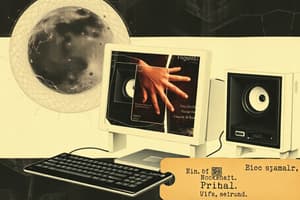Podcast
Questions and Answers
What is the significance of computer literacy in the modern world?
What is the significance of computer literacy in the modern world?
- It allows users to operate complex machinery only.
- It is only necessary for computer science students.
- It is essential for success in various fields. (correct)
- It helps individuals to understand financial systems.
Which of the following best describes the relationship between data and information?
Which of the following best describes the relationship between data and information?
- Data and information are the same thing.
- Data is the processed result, while information is the raw input.
- Data transforms into information through processing. (correct)
- Information is a collection of unrelated data.
What distinguishes system software from application software?
What distinguishes system software from application software?
- Both types of software perform the same functions.
- System software operates the computer hardware, while application software performs tasks for the user. (correct)
- System software is more user-friendly than application software.
- Application software is designed to manage hardware.
How do mobile users typically interact with computers?
How do mobile users typically interact with computers?
What is one critical advantage of sharing resources on a network?
What is one critical advantage of sharing resources on a network?
What is the primary function of the system unit in a computer?
What is the primary function of the system unit in a computer?
Which of the following best describes green computing?
Which of the following best describes green computing?
What is a key characteristic of a supercomputer?
What is a key characteristic of a supercomputer?
Which component is responsible for sending and receiving data over a network?
Which component is responsible for sending and receiving data over a network?
Which type of computer is specifically designed for single-player or multiplayer video games?
Which type of computer is specifically designed for single-player or multiplayer video games?
Flashcards
What is a computer?
What is a computer?
Electronic devices that process data based on stored instructions.
What is computer literacy?
What is computer literacy?
The ability to use computers effectively for work, communication, and accessing information.
What is data?
What is data?
Raw facts and figures, like numbers or text.
What is information?
What is information?
Signup and view all the flashcards
What is hardware?
What is hardware?
Signup and view all the flashcards
What is software?
What is software?
Signup and view all the flashcards
What is a network?
What is a network?
Signup and view all the flashcards
What is the internet?
What is the internet?
Signup and view all the flashcards
What is a personal computer?
What is a personal computer?
Signup and view all the flashcards
What is a game console?
What is a game console?
Signup and view all the flashcards
Study Notes
Objectives Overview
- Define "computer" as an electronic device that processes data based on stored instructions.
- Emphasize the importance of computer literacy for success in modern society.
- Identify the relationship between data (input) and information (output).
- Discuss the pros and cons of computer use, including user experiences.
- Describe the five key components of a computer: input devices, output devices, system unit, storage devices, and communications devices.
Understanding Computers
- The Information Processing Cycle consists of input, processing, and output.
- Real-life examples illustrate the input-process-output cycle in daily chores.
History of Computers
- Computers have evolved through distinct generations, each characterized by advancements in technology.
Computer Components
- Hardware: The physical elements of a computer, including:
- Input Devices: Allow users to enter data.
- Output Devices: Convey information to users.
- System Unit: Houses vital components for data processing.
- Storage Devices: Write and read data from storage media.
- Communications Devices: Facilitate data transmission between computers.
Advantages and Disadvantages of Computers
- Advantages: Speed, reliability, consistency, storage capacity, and communication capabilities.
- Disadvantages: Health risks, privacy violations, public safety concerns, labor force impacts, and environmental effects.
- Green computing focuses on reducing energy consumption and minimizing environmental waste.
Networking and the Internet
- A network is a collection of interconnected computers and devices.
- The Internet connects millions of entities, serving various purposes like communication, research, shopping, and entertainment.
- Social networking platforms allow users to share interests and content.
Software Overview
- Software: Programs that instruct computers on tasks.
- System Software: Includes operating systems and utility programs.
- Application Software: Performs specific tasks for users.
- Software installation involves setting up programs to interface with hardware.
Categories of Computers
- Computers vary significantly, including personal computers, mobile devices, game consoles, servers, mainframes, supercomputers, and embedded systems.
Personal Computers and Mobile Devices
- Personal computers can perform all functions independently, with popular types being desktop and laptop computers.
- Mobile devices include handheld gadgets such as smartphones, tablets, and portable media players.
Game Consoles and Servers
- Game consoles are specialized devices for gaming, supporting single and multiplayer formats.
- Servers manage resources on networks, providing centralized access to software and data.
Mainframes and Supercomputers
- Mainframes support large numbers of simultaneous users and are expensive.
- Supercomputers represent the pinnacle of performance, processing over one quadrillion instructions per second.
Embedded Computers
- Embedded computers are specialized systems within larger products, such as automobiles and home appliances.
Information System Elements
- An information system comprises hardware, software, data, people, and procedures.
Computer Usage Examples
- Different user types include home users, office users, mobile users, power users, and enterprise users, each utilizing computers in varied ways for tasks like communication, information transfer, and entertainment.
Applications of Computers in Society
- Computers significantly impact fields like education, finance, government, healthcare, science, publishing, travel, and manufacturing.
Summary
- Basic computer concepts involve understanding components, types, users, and the societal applications of computers, networks, and software.
Studying That Suits You
Use AI to generate personalized quizzes and flashcards to suit your learning preferences.
Related Documents
Description
Test your knowledge on the fundamentals of computing with this quiz designed for the CC101 Introduction to Computing course. Explore key concepts such as computer literacy and the components of a computer system. Perfect for reinforcing what you've learned from 'Discovering Computers 2012'.




